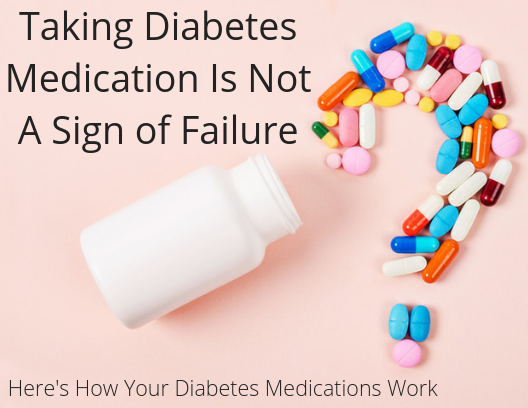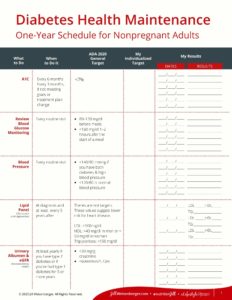How Your Diabetes Medications Work: Conquer High Blood Sugar
Did you know that your type 2 diabetes medications don’t just lower your blood sugar? Most of them actually target the problem that causes high blood sugar.

©Gamjai – Can Stock Photo Inc.
One of my patients with type 2 diabetes struggled to take her diabetes medications. Her doctor prescribed metformin twice daily, but she often forgot to take her evening pill. As we chatted about her blood sugar control, I explained why her fasting blood sugar numbers were often higher than her bedtime readings the night before. And it certainly wasn’t because she was eating in the middle of the night!
High Blood Sugar Has Many Causes
One of the common defects in type 2 diabetes (and in prediabetes) is excess blood sugar production from the liver. It’s a problem that’s unrelated to food. It’s part of reason that we often see high blood sugar levels even without eating. I told her that metformin’s job is to stop the liver from leaking out this extra sugar.
I’m pretty sure that I saw the light bulb go off in her head. She immediately recognized the value of her medications. It’s been a couple of years since this conversation, and I’m happy to report that she’s very consistent with taking her diabetes medications. As a result of her commitment to both drug and lifestyle therapies, her blood sugar control is way, way improved. And she’s very proud of her accomplishments.
So it was no surprise when I saw a headline saying that people who understand how their diabetes medications work have better blood sugar control. I’ve seen it with lots of patients.
The magic really happens when you also put your efforts into lifestyle strategies like wholesome food choices, losing weight if overweight, engaging in regular exercise and getting to bed on time.
Managing diabetes can be a lot of work. But I bet you know that already. Use my diabetes health schedule to stay on track of when you need this test and that appointment.
Get Your Free Copy of a Diabetes Health Schedule
How Diabetes Medications Work
There are multiple defects in type 2 diabetes. I’ll spare you the details, but just know that there are at least 8 core defects that might be working against you. Scientists have developed an arsenal of diabetes medications that target these various problem areas. The two main problems that you should understand now are these: insulin resistance and too little insulin production. These are always present in prediabetes and type 2 diabetes.
Insulin resistance is a condition in which the body doesn’t respond efficiently to the actions of the hormone insulin. The second problem – which tends to get worse the longer you have diabetes – is that the beta cells of the pancreas stop making enough insulin to keep your blood sugar in a healthy range.
The initial drug of choice is typically metformin, a pill that makes the body more sensitive to the actions of insulin and often helps people lose a few pounds. It’s relatively inexpensive, lowers the risk of heart attack in overweight individuals, and is unlikely to cause low blood sugar (hypoglycemia).
If a single medication and your body’s insulin production aren’t enough to manage your blood sugar levels, you’ll need a second drug. Because there are so many different types of diabetes medications that target the different core defects, you and your prescriber have a lot of options. But please know this:
- Taking diabetes medication is not a sign of failure. Nor is it a punishment for eating too much or exercising too little. Medications are critical tools in a large toolbox. When chosen properly, they will improve your health.
- Under-medication is a big problem because even short periods of poor blood sugar control contribute to eye, nerve and kidney problems years down the line. If you need medications now, take them. If lifestyle changes make them unnecessary later, you can your care provider can decide to discontinue them then.
- Taking an injectable drug like Victoza or even insulin doesn’t mean that your diabetes is more or less severe than if you were taking an additional pill.
- Healthful eating, weight loss if appropriate, and other lifestyle measures may help you reduce a medication dose, drop a medication or even all of your medications, or prevent you from needing a higher dose or additional medication.
Type 2 Diabetes Medications Chart
This is just a brief overview of how diabetes medications work. And it’s not even all the medications or classes of medications. These are some of the more common ones. I’m a certified diabetes educator as well as a registered dietitian nutritionist, so I typically discuss medications with my patients along with diet and other lifestyle treatments. But I’m not a pharmacist or a doctor. Check in with one of them for a more detailed discussion and to learn about possible side effects. This post should serve to get that conversation started.
| Drug Class | Examples of Drugs (not all medications are listed) | How It Helps |
|---|---|---|
| Biguanide | Metformin | Prevents the “leaky liver” from adding extra sugar into the bloodstream and makes muscle cells more sensitive to insulin. (Has a low risk of hypoglycemia.) |
| Dipeptidyl peptidase-4 inhibitors (DPP-4 inhibitors) | Sitagliptin, Saxagliptin, Linagliptin, Alogliptin | Prolongs the action of hormones in your gut, which increases your body’s own insulin, decreases sugar release from the liver, keeps food in your stomach longer and keeps you full longer. (Has a low risk of hypoglycemia.) |
| Sodium-Glucose Co-Tansporter-2 Inhibitors (SGLT-2 inhibitors) | Canagliflozin, Dapagliflozin, Empagliflozin, Ertugliflozin | Shuttles excess blood sugar into the urine to be excreted from the body. (Has a low risk of hypoglycemia.) |
| Thiazolidinediones (TZDs) | Pioglitazone, Rosiglitazone | Makes muscle and fat cells more sensitive to insulin and decreases excess sugar release from the liver. (Has a low risk of hypoglycemia.) |
| Sulfonylureas | Glimepiride, Glucotrol, Glyburide | Causes your pancreas to produce more insulin. These drugs will not help you if you have lost a lot of your insulin-producing capacity. |
| Meglitinides | Repaglinide , Nateglinide | Causes your pancreas to produce more insulin, but for less time than sulfonylureas. These drugs will not help you if you have lost a lot of your insulin-producing capacity. |
| Incretin mimetic (injectable) | Exenatide, Liraglitude, Dulaglutide, Lixisenatide, Albiglutide | Increases insulin synthesis in response to elevated blood sugar, decreases sugar release from the liver, keeps food in your stomach longer and keeps you full longer. (Has a low risk of hypoglycemia.) |
| Insulin (injectable, inhaled or administered by a pump) | There are many types of insulin. Some are long-acting and are often taken only once daily. Others are taken multiple times with meals. Some people will use more than one type of insulin. | Increases the passage of sugar from the bloodstream into the cells and decreases glucose release from the liver. |
Here’s something to make your diabetes management a little easier.
There’s a lot to keep track of with diabetes. Grab your free 1-year schedule of diabetes appointments and tests to keep you in your best health.
Filed Under: Diabetes, Prediabetes
Tagged: blood sugar, Diabetes Month, medications
Jill Weisenberger
I'm Jill, and I believe simple changes in your mindset and health habits can bring life-changing rewards. And I don't believe in willpower. It's waaaay overrated. As a food-loving registered dietitian nutritionist, certified diabetes care and education specialist and certified health and wellness coach, I've helped thousands of people solve their food and nutrition problems. If you're looking for a better way to master this whole healthy eating/healthy living thing or if you're trying to prevent or manage diabetes or heart problems, you'll find plenty of resources right here.
Leave a Reply
2 Comments
Leave a Comment
Welcome to my Blog
Hi there! I'm Jill, a nutrition & diabetes expert and the author of 4 books.

I believe simple changes in health habits can bring you life-changing rewards.
And I believe willpower is way overrated.
Right here is where you can discover the mindset and habits to stick with healthy lifestyle choices most of the time - and drop the guilt when you don't.
Get the Second Edition!

Featured Posts










I notice the opposite effect when taking my newer diabetes meds.The pills don’t make me fuller longer; rather, they seem to act against my stomach, pushing huge bowel movements out several times. These “attacks” can even wake me from sleep. The bowel movements are in keeping with what I would have if I was in an IBS/diarrhea attack, which come very infrequently now that my Celiac Disease is well controlled.
I am also taking arimidex and fenofibrate. Can these aggrevate my cholesterol issues?
Thank you.
Various diabetes medications have different action mechanisms and very different side effects. Your own pharmacist is the best person to answer you drug-related questions. Metformin may cause bowel discomfort and other problems, especially until the body has had time to adapt. The current injectable medications (other than insulin) frequently help with appetite control. My advice can’t be specific to you since I am not part of your healthcare team. Sounds like maybe it’s time for another conversation with your provider. Best wishes!